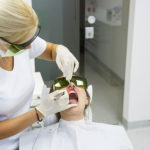
Tooth restoration evolved as a recognized specialty This speciality has developed in response to the factors such as greater expectations and patient awareness, increasing life expectancy, ability to treat the patients with more complex conditions, understanding the need to prevent oral diseases from developing and maintains oral health of a person, recent establishment of multidisciplinary clinical teams and the increasing recognition of the necessity of oral health for complex surgical and medical conditions.
Restoration dentistry is the diagnosis, study and integrated management of diseases of the teeth, oral cavity and supporting structures. Tooth restoration includes the rehabilitation of the teeth and the oral cavity to psychological, functional, and aesthetic requirements of the patient and includes the coordination of multi-professional working to achieve all these objectives. It also encompasses the dental speciality of Periodontics, Prosthodontics, and Endodontics and also its foundation is based on the interaction of the specialties in cases which requires complex multifaceted care.
Restoration dentistry is also known as ‘Oral Rehabilitation’ due to the increasing requirement for multidisciplinary and integrated care within and out along with the speciality including Oral and Maxillofacial surgery, Orthodontics, Dental and Maxillofacial Radiology, and Pediatric Dentistry due to the rising complexity of Oral health issues as people tend to live a longer life.
The focus of the Tooth restoration speciality is to work with other medical, surgical and dental specialists and other clonal colleagues to support and provide the integrated management and Oral Rehabilitation of the patients with more complex treatment needs such as:
- Patients affected by developmental disorders such as cleft lip and palate, hypodontia, amelogenesis imperfect, and aggressive periodontist is who require multidisciplinary and integrate care as recommended by peer assessment groups and national service frameworks.
- Patients who have undergone ablative surgery and radiotherapy for the treatment of Oral Cancer.
- Patients who have traumatic injuries to the teeth, mouth and face.
- Patients with severe surgical and medical issues to ensure the best treatment outcome.
- Patients who have sustained the damage caused by tooth decay, gum or periodontal disease, acid erosion, and tooth attrition.
Restoration dentistry specialist services are delivered by the consultants and specialists. A consultant will have a specific interest in one of the disciplines of tooth restoration. Consultants will also be completing a 5 competency based training program where the end point is determined by the competition of Intercollegiate Speciality Fellowship Examination. The training program covers a range of domains including clinical, knowledge, communication and teaching, management, and research with a significant proportion of time spent on management and clinical aspects including quality assurance, leadership, and integrated team working.
Specialists will have developed competence in areas such as Prosthodontics, Periodontology, and Endodontics for at least 3 years within the specialty.
Restoration dentistry services can be obtained in various settings which include district general hospitals, general dental practice, university teaching hospitals, specialist dental practice, and community dental services.



